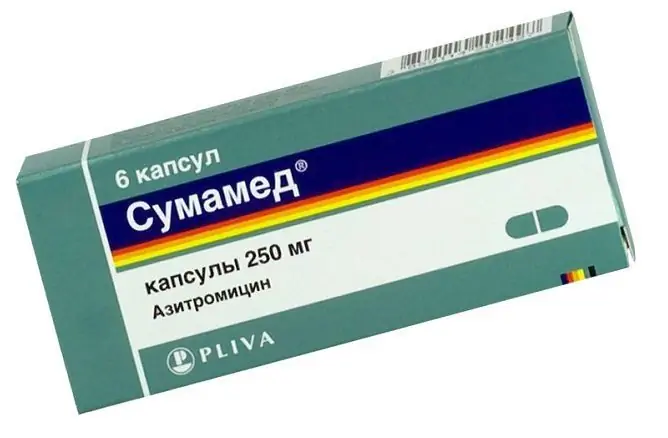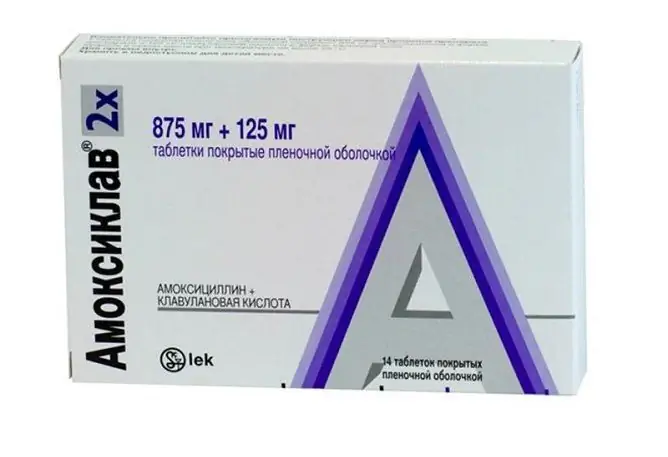- Author Rachel Wainwright wainwright@abchealthonline.com.
- Public 2023-12-15 07:39.
- Last modified 2025-11-02 20:14.
Depo-Provera
Depo-Provera: instructions for use and reviews
- 1. Release form and composition
- 2. Pharmacodynamics and pharmacokinetics
- 3. Indications for use
- 4. Contraindications
- 5. Method of application and dosage
- 6. Side effects
- 7. Overdose
- 8. Special instructions
- 9. Special instructions
- 10. Application during pregnancy and lactation
- 11. For violations of liver function
- 12. Drug interactions
- 13. Analogs
- 14. Terms and conditions of storage
- 15. Terms of dispensing from pharmacies
- 16. Reviews
- 17. Price in pharmacies
Latin name: Depo-Provera
ATX code: G03DA02
Active ingredient: Medroxyprogesterone acetate (Medroxyprogesterone acetate)
Manufacturer: Pfizer (Belgium)
Description and photo update: 2019-06-08

Depo-Provera is a drug with antitumor, gestagenic action.
Release form and composition
Dosage form - white suspension for injections (1 ml in vials or disposable syringes, or 3.3 and 6.7 ml in vials, 1 vial or syringe in a cardboard box).
The composition of 1 ml of suspension includes:
- Active ingredient: medroxyprogesterone acetate - 150 mg;
- Auxiliary components: polysorbate 80, polyethylene glycol 3350, sodium chloride, propylparaben, methylparaben, water for injection.
Pharmacodynamics and pharmacokinetics
Medroxyprogesterone acetate (MPA) is a progesterone derivative that does not have estrogenic activity and belongs to gestagens (progestins). The androgenic activity of the compound is minimized. MPA in therapeutic doses reduces the production of pituitary gonadotropins, preventing the maturation of follicles and causing anovulatory state in women of reproductive age. This effect leads to a decrease in the severity of vasomotor symptoms in women in the menopausal period. MPA also increases the viscosity of cervical mucus that accumulates in the cervical canal, making it virtually impossible for sperm to penetrate.
In some cases, the anabolic effect and anti-inflammatory effect of the drug are noted. In high doses, it is characterized by glucocorticosteroid activity.
After intramuscular administration of medroxyprogesterone acetate, it is released rather slowly, which causes a low but constant level of MPA in blood plasma. The maximum concentration of the substance after injection is reached in approximately 4-20 days, after which the content of MPA gradually decreases and is approximately 1 ng / ml over a period of 2-3 months. However, the compound may be present in blood plasma even 7-9 months after intramuscular injection. About 90-95% of MPA binds to proteins in blood plasma. The volume of distribution is 20 ± 3 liters.
Medroxyprogesterone acetate crosses the placental and blood-brain barriers, as well as into breast milk. The half-life is on average 6 weeks. MPA is metabolized in the liver and excreted mainly by biliary secretion through the intestine. Approximately 44% of MPA is excreted unchanged through the kidneys. More than 10 metabolites of the compound are known, the excretion of which is carried out together with urine, and mostly in the form of conjugates.
Indications for use
- Recurrent breast cancer in women in menopause (hormone-dependent forms);
- Metastatic and / or recurrent renal and endometrial cancer.
Contraindications
- Pregnancy and the period of breastfeeding (lactation);
- Hypersensitivity to drug components.
Instructions for use of Depo-Provera: method and dosage
In the treatment of breast cancer, the drug is used intramuscularly. The initial daily dosage of Depo-Provera is 500 mg, the duration of the course is 28 days. At the end of this period, they switch to the use of maintenance doses - 2 times a week, 500 mg each. Therapy should be continued until signs of regression of the disease appear.
In the treatment of kidney cancer, the drug is administered intramuscularly at an initial dose of 400-1000 mg per week. If the condition improves and stabilizes within a few weeks or months, maintenance therapy of 400 mg per month is prescribed.
Immediately before use, the bottle must be shaken well (the injected drug must take the form of a homogeneous suspension).
Side effects
During therapy, the development of disorders from some body systems is possible:
- Reproductive system: galactorrhea, dysfunctional uterine bleeding, amenorrhea, spotting from the genital tract, breast tenderness, decreased libido or anorgasmia, vaginitis, hot flashes, leucorrhoea, lower abdominal pain;
- Digestive system: nausea, discomfort or abdominal pain, flatulence;
- Musculoskeletal system: joint and back pain, calf muscle cramps;
- Blood coagulation system: thrombophlebitis, thromboembolism;
- Central nervous system: dizziness, insomnia, increased nervous irritability, drowsiness, depression, fatigue, headache;
- Dermatological reactions: acne, rash, pruritus, alopecia and hirsutism;
- Allergic reactions: anaphylaxis and anaphylactoid reactions, urticaria;
- Others: hyperthermia, asthenia, moon face and changes in body weight.
Overdose
If the recommended dosage is exceeded, Depo-Provera can lead to increased fatigue, an increase in body weight (with a slight fluid retention), as well as, in isolated cases, to the occurrence of effects characteristic of glucocorticoids. There is no specific antidote for such cases. You must stop using the drug.
special instructions
Before starting treatment, you must conduct a thorough examination of the patient.
If symptoms of thromboembolism develop, the benefit-risk ratio should be assessed before continuing therapy.
When using medroxyprogesterone acetate in high doses in cases of the development of the Itsenko-Cushing symptom complex (fluid retention, moonlike face, decreased glucose tolerance, increased blood pressure), it is necessary to reduce the dose as much as possible and carefully monitor the patient's condition. Also, the use of high doses of the drug can lead to an increase in body weight and the development of fluid retention, as a result of which caution must be exercised during the treatment of patients whose condition these disorders may have an adverse effect.
It is necessary to carefully monitor the condition of patients with a history of indications for treatment for depressive conditions, since when using medroxyprogesterone acetate, some patients complained of depression, similar to premenstrual depression.
When conducting histological or cytological examinations of the endometrium or cervix of the uterus, the histologist should be warned about the therapy.
According to the instructions, Depo-Provera should be used with caution in the postpartum period, this is associated with an increased risk of prolonged and heavy uterine bleeding.
It is believed that ongoing therapy may increase the risk of osteoporosis.
The use of the drug should be discontinued in case of sudden partial or complete loss of vision, as well as in cases of double vision, bulging, migraine attacks. If during the examination, swelling of the optic nerve papilla or damage to the vessels of the tissue is detected, the drug should not be prescribed.
If jaundice develops, the drug should be discontinued.
The use of Depo-Provera can increase the values of liver function indicators, change the test results for prothrombin (factor II) and blood clotting factors VII, VIII, IX, X (upward), and also affect the results of the following laboratory tests:
- Determination of levels of cortisol, progesterone, estrogen in blood plasma (downward);
- Determination of the levels of gonadotropins (downward);
- Determination of testosterone level in blood plasma (downward);
- Determination of the level of pregnandiol in urine (downward);
- Carrying out a sugar load test (glucose tolerance test);
- Determination of the level of specific globulin that binds sex hormones (downward);
- Metapyrone test.
special instructions
Influence on the ability to drive vehicles and complex mechanisms
The effect of medroxyprogesterone acetate on the ability to drive a car and complex mechanisms has not been sufficiently studied, but it should be borne in mind that the drug can cause dizziness and other disorders of the central nervous system. For this reason, when performing the actions described above during treatment with the drug, it is recommended to be careful.
Application during pregnancy and lactation
Pregnancy is a contraindication to the use of Depo-Provera, since under certain conditions a connection has been revealed between the intake of progestogens in the first trimester of pregnancy and fetal anomalies.
With an unplanned pregnancy that occurs within 1-2 months after intramuscular injection of MPA, the risk of malnutrition in newborns increases, which increases the risk of intrapartum and neonatal mortality. Such complications are rare, since conception is rare with MPA. If pregnancy occurs immediately after the introduction of MPA, the woman should be warned about the possible risks to the fetus.
MPA passes into breast milk. There is no evidence that this can be dangerous for a breastfed baby, but it is not recommended to prescribe Depo-Provera during the first 6 weeks of the postpartum period.
For violations of liver function
If the patient develops jaundice, the drug should be discontinued.
Drug interactions
There are no data on interactions with other drugs.
With simultaneous use with aminoglutethimide, a significant decrease in the bioavailability of medroxyprogesterone acetate is possible.
Analogs
An analogue of Depo-Provera is Medroxyprogesterone-Lance.
Terms and conditions of storage
Store in a dark, dry place out of reach of children at a temperature of 20-25 ° C.
The shelf life is 5 years.
Terms of dispensing from pharmacies
Dispensed by prescription.
Reviews about Depo-Provera
Most often, reviews about Depo-Provera relate to its use by women as a means of contraception. Many of them note that taking 150 mg of the drug once every 3 months was really effective in preventing conception. However, in many cases of using the drug, various side effects are observed, for example, an increase in body weight.
Physicians have differing opinions regarding medroxyprogesterone acetate. Some of them recommend using it to all their patients, other experts believe that the drug is more suitable for older women. There are numerous reviews indicating that the introduction of Depo-Provera can provoke complications during subsequent pregnancy or complicate conception even after a long time.
Some people even administer Depo-Provera to cats, using it as a method of contraception. However, the consequences can be severe: experienced breeders claim that 90% of animals remain sterile after using the drug.
Depo-Provera price in pharmacies
On average, the price for Depo-Provera 150 mg ranges from 215 to 245 rubles (for a 3.3 ml bottle) and from 120 to 140 rubles (for a 1 ml bottle).

Maria Kulkes Medical journalist About the author
Education: First Moscow State Medical University named after I. M. Sechenov, specialty "General Medicine".
Information about the drug is generalized, provided for informational purposes only and does not replace the official instructions. Self-medication is hazardous to health!






